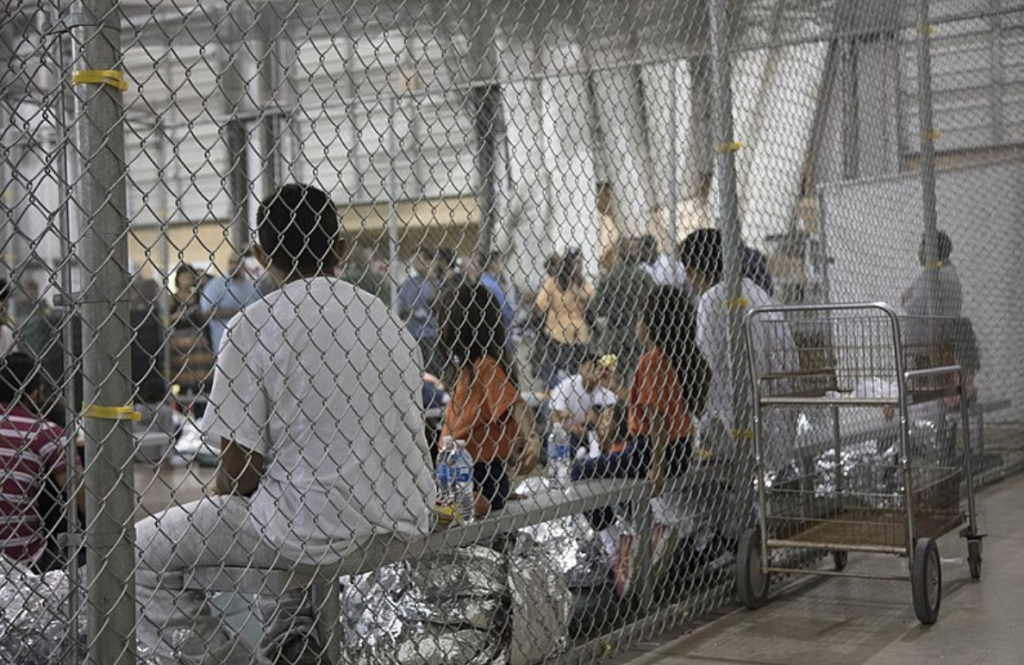
“Ursula (detention center),” United States Government, (CC-BY). [x]
Tonight, over 52,000 people will fall asleep in detention centers across the United States. Many have come fleeing gang violence, domestic violence, and poverty. They are hungry, as they are not given sufficient food, and the little food that is given is lacking in nutrients, or sometimes even rotten. They are not guaranteed to receive toothbrushes and soap. Conditions are so inhumane and so clearly based in xenophobia that U.S. Representative Alexandria Ocasio-Cortez has called detention centers “concentration camps.”1
Migrants held in detention have not been convicted of a crime. Rather, they are being held to ensure that they will attend the court hearing that will determine whether or not they will be allowed to stay in the United States. There is no definite end date to their detention. The average person will have been held for four weeks by the time of their release, but some have been held for months or years.2 Once used only for those deemed a possible danger to society, detention is now ubiquitous, applying even for children still in diapers.3Asylum seekers, legal migrants, and even, mistakenly, U.S. citizens have been unlawfully detained. Expedited removal policies, in which immigration officers take on the duties of both a prosecutor and judge, have created an environment in which the charge of deportation and the decision to deport a person are made within hours of each other. Considerations that might allow a person to remain in the United States, such as being eligible to apply for lawful status, are not reviewed.4
Thousands of children have been separated from their families by U.S. Immigration and Customs Enforcement (ICE) under the official zero-tolerance policy put forth by the Trump administration, despite an injunction from U.S. District Court Judge Dana Sabraw forbidding this practice.5Between the official end of the zero-tolerance policy in June 2018 and March 2019, four hundred children were separated from their families. However, regardless of the abolition of the policy, these separations continue on to this day. Today, five children will be separated from their families under the Trump administration’s orders. Tomorrow, five more.6
A human rights crisis is occurring within the United States. Under the orders of the Trump administration, ICE ignores U.S. law and the basic human rights that should be afforded to every person, regardless of their country of origin. A year ago, the public outcry against family separation was deafening. News cycles on every channel covered it constantly, and it featured on the front pages of all the major news sources. Social media was flooded with outrage and protesters organized across the country.7 Within months, the Trump administration brought an official end to the zero-tolerance policy under which children had been separated from their families. The enormous attention paid to the abuses of the family separation policy is largely a result of the news and social media. Human rights causes have received more public attention thanks to social media and have forced politicians to act against them when action otherwise might not have been taken.8
Today, the shock and horror that characterized discussions of family separation and migrant detention is notably absent. The mobilization against family separation took place almost overnight, but it died away just as fast only a few months later. The same atrocities are still being committed, so where has the outcry gone?
The shocking actions of the Trump administration have become normalized. Actions that seemed unbelievable only months ago now begin to seem routine. The citizens of several Muslim majority countries are subject to a travel ban by the United States. Trump openly incites violence at his rallies. His military decisions have created an ongoing crisis of ethnic cleansing in northern Syria. Acceptance by politicians eases this process of normalization. South Carolina senator Lindsey Graham called Trump “unfit for office” during the Republican primaries in 2016, but only a year later expressed concern that the American press was making “an endless, endless attempt to label the guy as . . . not fit to be president.”9The speed at which scandals occur is disorienting. Each new wrongdoing obscures the shocking effects of the previous one; each new wrongdoing is accepted by right-wing politicians and the media.
Topics gather widespread attention in a matter of hours and dominate the news cycle but focus quickly shifts as interest dies down. New issues begin to take precedence over previous topics of interest. Activism and public pressure make a similar shift. As focus turns toward a new story, the public ceases to hold politicians accountable for the previous attention-grabbing issue. Detention centers and family separation have followed this predictable pattern. ICE has continued to separate children from their families and has continued to create conditions so inhumane that seven children have died in detention centers.10The media cycle creates an environment that makes it easy to forget these facts that incited global horror only a year ago.
Hold the people in power accountable. Keep watching, keep talking. Remember your anger. There are 52,000 people who need it.
Edited by Alisia Bello
References
1 Hignett, Katherine. “Academics rally behind Alexandria Ocasio-Cortez over concentration camp comments: ‘She is completely historically accurate’.” Newsweek, 24 June 2019. https://www.newsweek.com/alexandria-ocasio-cortez-concentration-camps-immigrants-detention-centers-southern-border-experts-1445483.
2 Kassie, Emily. “Detained: How the US built the world’s largest immigration detention system.” The Guardian, 24 September 2019. https://www.theguardian.com/us-news/2019/sep/24/detained-us-largest-immigrant-detention-trump.
3 Kassie, Emily. “Detained: How the US built the world’s largest immigration detention system.” The Guardian, 24 September 2019. https://www.theguardian.com/us-news/2019/sep/24/detained-us-largest-immigrant-detention-trump.
4 Werlin, Beth. “The Human Cost of Fast-Track Deportation.” The New York Times, 25 July 2019. https://www.nytimes.com/2019/07/25/opinion/politics/expedited-deportation-trump-immigration.html?searchResultPosition=43.
5 Jarrett, Laura. “Federal judge orders reunification of parents and children, end to most family separations at the border.” CNN Politics, 27 June 2018. https://www.cnn.com/2018/06/26/politics/federal-court-order-family-separations/index.html.
6Shepherd, Katie. “Up to 5 Migrant Children Are Still Separated from Their Family Every Day, New Government Data Shows.” Immigration Impact, American Immigration Council, 26 June 2019. http://immigrationimpact.com/2019/06/26/migrant-children-still-separated/#.XcL75kVKjOR.
7Kim, Vivekae. “‘Free our children now’ — On the U.S.-Mexico border, activists protest separation of immigrant families.” PBS: Public Broadcasting Service, 17 June 2018. https://www.pbs.org/newshour/nation/mexico-border-activists-immigrant-children-separation.
8 Vigo, Julian. “Internet Advocacy: How It Has Shifted Human Rights Struggles.” Forbes, 25 August 2019. https://www.forbes.com/sites/julianvigo/2019/08/25/internet-advocacy-how-it-has-shifted-human-rights-struggles/#5c2f62d52e8f.
9 Younge, Gary. “Despite all the warnings, we are normalising Donald Trump.” The Guardian, 8 June 2018. https://www.theguardian.com/commentisfree/2018/jun/08/donald-trump-president-visits-uk.
10Morales Rocketto, Jess. “Seven Children Have Died in Immigration Custody. Remember Their Names. Buzzfeed News, 30 September 2019. https://www.buzzfeednews.com/article/jessmoralesrocketto/remember-their-names.




